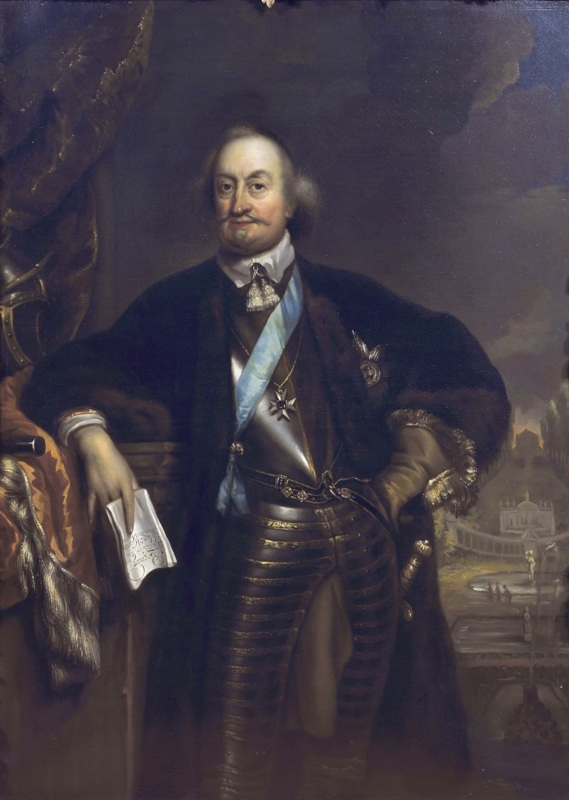第二卷 論概念(Book II: Of Ideas)有三十三章;第二十七章 論唯一性和差異性(Chapter XXVII: Of Identity and Diversity)----這一章涉及意識、物質實體、精神、獨立個人的原則(Principium Individuationis.)、時間和空間相關聯繫如何形成差異性等精細概念的辯證,也是非常的精彩的一章---這一節是辯證相同的人和人格的唯一性的本質差異”!!
- 相同的人(Same man.) 一個動物是一個有生命組織的身體;因此,所謂相同的動物,就如我們的觀察,是傳遞各種物質分子的相同續存生命,他們(各種物質分子)碰巧承續的結合成有組織的生命實體。不論所論及的其他任何定議,精細的觀察去除對它(相同的動物)的疑問,由我們口中所發出的人字聲音,是的我們心中概念的標記,不是別的只是具有某種外貌的一種動物。….(An animal is a living organized body ; and consequently the same animal, as we have observed, is the same continued life communicated to different particles of matter, as they happen successively to be united to that organized living body. And whatever is talked of other definitions, ingenious observation puts it past doubt, that the idea in our minds, of which the sound man in our mouths is the sign, is nothing else but of an animal of such a certain form. ….)

拿騷-錫根的約翰·毛里茨(John Maurice of Nassau)畫像
這之後的一大段是引用威廉鄧普勒· 第一次男爵(Sir William Temple, 1st Baronet,25 April 1628 – 27 January 1699) 1691年出版的” Memoirs of what paft iu Christendom from the war of 1672 to peace conclude 1679”第三次英荷戰爭期間的回憶錄中提到他親耳聽聞拿騷-錫根的約翰·毛里茨(John Maurice of Nassau , 17 June 1604 – 20 December 1679)講述” 毛里茨統治巴西的時候,有個能說話,並且能提、能答普通的問題,一如有理性的動物一樣的老鸚鵡”的傳說故事,來支持洛克下述的論點----因為我覺得,在大多數人的感覺中,人的概念不只限於能思想或有理性: 此外還有實體,某種形相,與它(人的概念)聯結在一起: 如果人的概念是這樣,相同續存的實體不會全部立刻的改變,必須和相同的非物質的精神,共同創作相同的人。 (For I presume it is not the idea of a thinking or rational being alone that makes the idea of a man in most people’s sense : but of a body, so and so shaped, joined to it : and if that be the idea of a man, the same successive body not shifted all at once, must, as well as the same immaterial spirit, go to the making of the same man.)
- 人格的唯一性(Personal identity.) 這前提是,為了找出人格唯一性的內在組成,我們必須考量人格者代表什麼:--我認為,是有智慧能思考的生物,具有理性和反省能力,相同思考的東西,在異時異地,並能將自身當作自身;它(人格者) 只能經由不能與思想分離的覺識完成,而且,它(人格者)對我看來好像,是它(人格者)的本質:因為它(人格者) 不可能對任何一個(已發生的)察覺,不會察覺不到他完成的覺察。當我們看、聽、嗅、嚐、感覺、沈思、意決任何事物時,我們瞭解我們這樣完成。(This being premised, to find wherein personal identity consists, we must consider what person stands for ; – which, I think, is a thinking intelligent being, that has reason and reflection, and can consider itself as itself, the same thinking thing, in different times and places ; which it does only by that consciousness which is inseparable from thinking, and, as it seems to me, essential to it : it being impossible for any one to perceive without perceiving that he does perceive. When we see, hear, smell, taste, feel, meditate, or will anything, we know that we do so.)因此,它(人格者)總是如同當下的感覺和知覺的:而且憑藉這些對每個人是他稱為自我的他本身:--在這種場合下,人們並不思考,相同的自我還是續存在相同或不同的實體中。( Thus it is always as to our present sensations and perceptions : and by this every one is to himself that which he calls self : – it not being considered, in this case, whether the same self be continued in the same or divers substances.)因為覺識既然常常伴著思想,而且它(覺識)能使每個人成為他所謂自我,因而使他本身和所有其他能思想的事物有所區別,這就單獨的組成人格的唯一性,也就是理性的生物的相同性:而且只要這覺識能回朔過去的行動或思想時,能到多遠,這個人的唯一性也就達到同樣的程度; 它(覺識)是現在相同的自我就是過去那時的它(覺識);而且它(覺識)經由相同的自我和現在它(覺識)反省呈現的這一個(自我) ,這樣這個行動(人格的唯一性)就完成了。( For, since consciousness always accompanies thinking, and it is that which makes every one to be what he calls self, and thereby distinguishes himself from all other thinking things, in this alone consists personal identity, i.e. the sameness of a rational being : and as far as this consciousness can be extended backwards to any past action or thought, so far reaches the identity of that person ; it is the same self now it was then ; and it is by the same self with this present one that now reflects on it, that that action was done.)
- 意識構成人格的唯一性(Consciousness makes personal identity.) 不過它(人格的唯一性)還要進一步探究,它是否是相同的唯一的實體?很少數的(人)會認為他們有理由懷疑,如果這些知覺,與他們的覺識,永遠在心中留存,在那相同的思維事物將永遠有覺識的呈現在心中,並且,將被認為,顯然的和它自身(人格者)相同。不過在這裡卻似乎有一種困難,就是這個覺識經由遺忘常常被間斷,在我們一生中,沒有一個瞬間,在那我們能使我們過去整個系列行動在我們眼前成為一個圖像,而且即使最好的記憶,在他們正在觀察另一部分時,也會丟失部分的圖像; 而且我們有時,並且是一生的大部分,並不反省我們過去的自我,而著重在我們現在的思考,而且在酣睡中,竟然完全沒有思考,至少全然沒有標記覺醒時思考的覺識,---我認為,在所有這些情形下,我們的覺識是被間斷的,我們是失去了我們過去的自我的圖像,懷疑就產生了,我們是否是相同能思考的事物,也就是,是相同的實體或不是。(But it is further inquired, whether it be the same identical substance. This few would think they had reason to doubt of, if these perceptions, with their consciousness, always remained present in the mind, whereby the same thinking thing would be always consciously present, and, as would be thought, evidently the same to itself. But that which seems to make the difficulty is this, that this consciousness being interrupted always by forgetfulness, there being no moment of our lives wherein we have the whole train of all our past actions before our eyes in one view, but even the best memories losing the sight of one part whilst they are viewing another ; and we sometimes, and that the greatest part of our lives, not reflecting on our past selves, being intent on our present thoughts, and in sound sleep having no thoughts at all, or at least none with that consciousness which remarks our waking thoughts, – I say, in all these cases, our consciousness being interrupted, and we losing the sight of our past selves, doubts are raised whether we are the same thinking thing, i.e. the same substance or no.)然而這些合理或不合理,和人格的唯一性完全無關。 這問題是什麼造成相同的人格者;並不在於是否相同恒等的實體,而這 (相同恒等的實體)總是在相同的人格者中思考,這(相同的人格者),在這個例證中,全然不相干 : 不同的實體,經由相同的覺識(在這他們(不同的實體)確實參與它(覺識)之中)被聯合組成一個人格者,正如各種不同的實體經由相同的生命被聯合組成一個動物,那些動物的唯一性被保存在改變的實體中經由一個續存的生命個體。(Which, however reasonable or unreasonable, concerns not personal identity at all. The question being what makes the same person ; and not whether it be the same identical substance, which always thinks in the same person, which, in this case, matters not at all : different substances, by the same consciousness (where they do partake in it) being united into one person, as well as different bodies by the same life are united into one animal, whose identity is preserved in that change of substances by the unity of one continued life.)因為,使一個人保持他自身回到他自身就是持續存有相同的覺識,人格唯一性就只能依靠這個(相同的覺識) ,不論它(相同的覺識)是附著于單一的實體,或是在能續存的許多實體中。因為只要任何有靈性的生物能以與生俱來的相同覺識重複任何過去的行動概念,並伴有它(實體)對現在行動所具有的相同覺識;那麼它(實體) 仍然有相同的人格自我。 因為它(實體)對當下的思想和行動有一種覺識,那麼這個覺識可以擴展及於過去或未來的行動,而且將經由時間的距離,或實體的變化,正是一個人經由今天同昨天所著的衣服不同,及在兩日之間有長或短的睡眠,不會成為兩個人格者: 這相同的覺識,不論是由什麼實體協同產生他們的成果,連合那些相隔絕的各種行動成為相同的人格者。 For, it being the same consciousness that makes a man be himself to himself, personal identity depends on that only, whether it be annexed solely to one individual substance, or can be continued in a succession of several substances. For as far as any intelligent being can repeat the idea of any past action with the same consciousness it had of it at first, and with the same consciousness it has of any present action ; so far it is the same personal self . For it is by the consciousness it has of its present thoughts and actions, that it is self to itself now, and so will be the same self, as far as the same consciousness can extend to actions past or to come and would be by distance of time, or change of substance, no more two persons, than a man be two men by wearing other clothes to-day than he did yesterday, with a long or a short sleep between : the same consciousness uniting those distant actions into the same person, whatever substances contributed to their production.)

Free counters

|


 字體:小 中 大
字體:小 中 大









